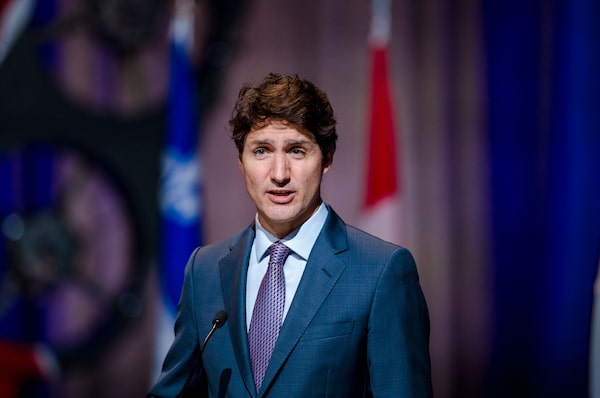
Prime Minister Justin Trudeau.ANDREJ IVANOV/AFP/Getty Images
Canada’s chief electoral officer lobbed a grenade onto a mostly empty Parliament Hill last Friday by unveiling a proposed redistribution of House of Commons seats that would see a province lose an MP for the first time in five decades.
In announcing that Quebec’s representation would fall by one seat to 77, as part of a decennial review that would result in an overall increase in size of the House to 342 seats from the current 338, Stéphane Perrault effectively threw a ticking time bomb into Prime Minister Justin Trudeau’s lap. It is now up to Mr. Trudeau to decide whether to overrule Elections Canada.
To be clear, Mr. Perrault is just doing his job. Under the Fair Representation Act passed by former prime minister Stephen Harper’s Conservatives in 2011, which added 30 seats to the House all at once, the die was cast for the scenario now unfolding.
The Constitution mandates a redistribution of Commons seats after each decennial census to account for population shifts. The redistribution formula adopted in 2011 yielded the new numbers that Mr. Perrault posted last week. Under the revision, which would take effect in 2024, Alberta would gain three MPs for a total of 37. British Columbia and Ontario would each gain one seat, bringing their respective totals to 43 and 122.
Only rarely since Confederation has any province seen its seat count fall. The last time it happened was in 1966. Most of the time, attempts have been made to accommodate slow-growing provinces. In 1915, when Prince Edward Island faced losing a seat, a rule was introduced to ensure that no province had fewer MPs than senators. In 1985, the formula was amended to ensure no province ended up with fewer seats than it had then, regardless of future shifts in population.
It’s time for Justin Trudeau to let Parliament out of quarantine
Mr. Harper’s government upset the apple cart with its 2011 reform.
“Canadians living in Ontario, British Columbia and Alberta have become significantly under-represented as their populations have grown,” Tim Uppal, then Conservative minister of state for democratic reform, said in introducing the Fair Representation Act in 2011.
The bill, which passed a divided House 154 votes to 131, saw Ontario gain 15 seats, while Alberta and B.C. each got six more MPs. Quebec was initially slated to remain at 75 seats, but an outcry in the province resulted in it receiving three more MPs. At the time, Quebec’s National Assembly passed a unanimous resolution calling on MPs to renounce adopting any bill that had the effect of reducing Quebec’s share of Commons seats.
The prospect of Quebec now losing a seat has politicians there once again up in arms.
“We are the only francophone province,” Quebec’s minister responsible for Canadian relations, Sonia LeBel, said on Tuesday. “We have a special status, a nation to defend, and just like the Atlantic provinces and the territories, our specificity should ensure we do not lose seats in the House of Commons.”
Still, even if Quebec manages to hold all 78 seats, its share of Commons seats is slated to continue to decline in coming decades. From 36 per cent of MPs at Confederation, Quebec has seen its weight in the House fall continuously since then. It stood at 25 per cent at the turn of this century, fell to 23 per cent in 2011, and is now slated to dip to 22.5 per cent.
The 1992 Charlottetown constitutional accord would have guaranteed Quebec a minimum of 25 per cent of Commons seats, in exchange for a reduction in its Senate seats to six from 24. The accord was rejected in a national referendum, leaving Quebec to cling to the 1985 amendment ensuring that it is never allotted fewer than 75 seats.
Between 2011 and this year, B.C., Alberta and Ontario all experienced double-digit population growth. Alberta’s population grew by 16 per cent, B.C.’s by 13.5 per cent and Ontario’s by 12 per cent. During the same period, Quebec’s population grew by 7.5 per cent, though most of the increase came earlier in the decade. Population growth slowed sharply after the Coalition Avenir Québec government slashed immigration levels after the 2018 election. That trend is not likely to soon reverse itself, as Premier François Legault continues to reject calls to increase the number of immigrants the province accepts each year, despite a severe labour shortage.
That choice comes with consequences, though that will not stop the Legault government, backed by Quebec’s opposition parties and the Bloc Québécois, from putting pressure on Mr. Trudeau to protect the province’s current seat count. The Prime Minister owes nothing to Mr. Legault, who openly campaigned against the federal Liberals in last month’s election campaign. But, on this issue at least, Mr. Trudeau likely will not be able to resist accommodating him.
Keep your Opinions sharp and informed. Get the Opinion newsletter. Sign up today.
 Konrad Yakabuski
Konrad Yakabuski